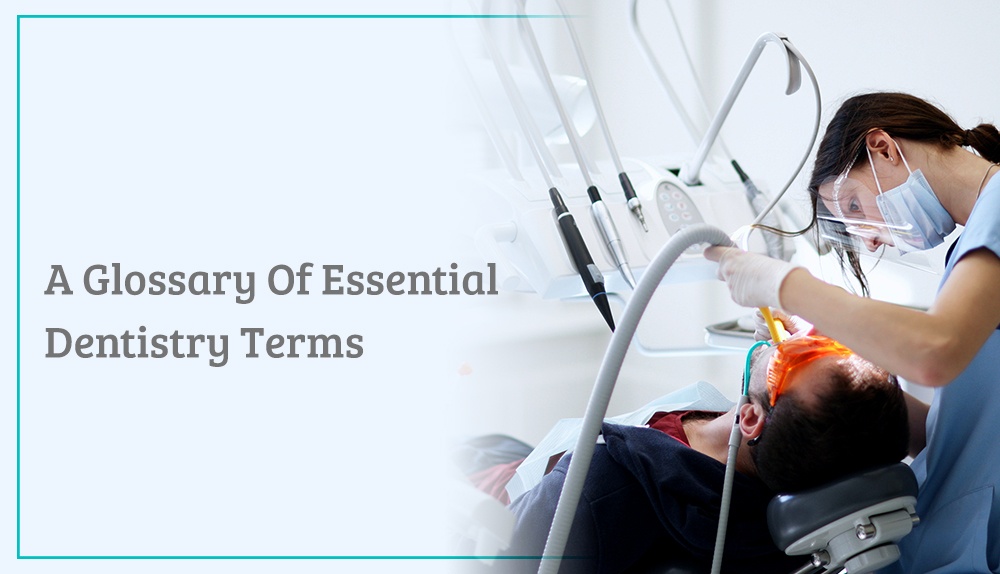A Glossary Of Essential Dentistry Terms

Every industry has its own language and terms. These words and phrases can be confusing to anyone who is not part of the daily operations of a specific sector, and the dentistry business is no exception.
To help you understand the terms, acronyms, and phrases regularly used when visiting your dentist, the experts at Dentists on Bloor have created this handy reference guide. Here you’ll find valuable information allowing you to comprehend and communicate your dentistry needs effectively.
Cap or crown
These are artificial coverings of a tooth. They can be made out of a variety of different materials that cover the damaged natural tooth. They are used to cover and protect a badly broken-down natural tooth or change its shape and color. They can also make the tooth stronger. The material used to make caps or crowns is typically metal, porcelain fused to metal or all-porcelain.
Implant
It is often confused with a post. The implant replaces the entire tooth (the root and crown). It’s used when the natural tooth needs to be removed due to extensive damage or poor bone support from gum disease. A titanium screw is integrated into the jaw bone that replaces the entire natural tooth. It is independent of any other tooth. It cannot get a cavity since it is all artificial and it functions like any other tooth in the mouth and looks like a tooth.
Post
It’s a structure placed in the root of a tooth with a root canal to help strengthen the tooth and support a filling or crown. It’s used when there is a little tooth left with a lot of filling. It can be made of metal or reinforced fiber. Not to be confused with an implant.
Retainers
These are oral appliances that hold (retain) the teeth in place. However, in a growing child, you can use a retainer type of oral appliance to help develop the jaw structure before braces are needed. It can help expand the jaw while growing or fix the bite.
Invisalign
It’s a clear plastic aligner that helps straighten teeth. It is a term often used to describe a way to move teeth without metal braces. Invisalign is the name of a product that does this job. Many other types of clear plastic aligners do the same thing, including CLEAR CORRECT, SURE SMILE and others.
Root canal
It’s a type of treatment that treats an infected nerve inside the tooth’s root. It leaves the tooth intact (root and crown), only removing the core that contains the nerve and blood supply. Root canals are not painful but rather get you out of pain while decreasing the chance of a potential nasty infection, which would require tooth extraction. With a root canal you still maintain a root in the jaw.
Recall appointment
It’s the combined parts of oral health maintenance. It includes a cleaning (scale off the tartar and polish off the plaque) and examination of the hard and soft tissue of the mouth. The frequency of this treatment depends on your periodontal status, your overall ability to keep your mouth free of tartar and plaque. Some people come every three months for this while others choose six-month intervals. Some refer to this as a check up.
Bonding
This is a technique used to do fillings or repair a lost tooth structure. These are done with white fillings that fill the hole created by a cavity and fill in spaces or gaps between teeth due to minor or chipped teeth. Dentists refer to these as fillings but not always if there is a cavity. The materials used are composite or plastic resin.
Gingivitis
It refers to bleeding gums due to inflammation caused by tartar, plaque, hormones, stress, or systemic disease. It can be treated with regular brushing, flossing, mouth wash, and manual removal of the cause (through regular dental cleanings).
Holistic dentistry
It’s when a dentist does not use any harmful chemicals. Mercury fillings, also known as Amalgam, metal, or silver fillings, are not used in holistic dentistry. Instead, white composite fillings that are more biocompatible are used.
There is, however, no way at present to treat teeth without any chemicals completely. Fluoride found in toothpaste can be substituted for Xylitol. Also, doing fillings on baby teeth can be substituted for Silver Diamine Fluoride to help arrest the cavity progression until it falls out.
But, it does not replace the regular filling needed when there is a large enough hole in an adult tooth. The holistic concept is moving away from the drill and fill process. Therefore, we look at the whole patient to assess the overall oral health and oral risk factors before choosing a certain procedure.
We hope these terms made you feel more confident to visit your dentist. If you’re looking for a dental clinic in Toronto, ON, reach out to the experts at Dentists on Bloor. With many years of experience in the dentistry sector, our goal is to assist our patients in achieving an ideal state of oral health in a professional, friendly and safe environment. Our services include first dental visits, child dental visits, professional teeth cleaning, wisdom teeth removal, cosmetic dentistry, and dental crowns and bridges. We offer our services across The Stockyard and High Park, Annex, Dovercourt Village, Dufferin Grove, Trinity Bellwoods, Yorkville, and Christie Pits. We also reach out to Harbord Village, Palmerston-Little Italy, Brockton Village, Bickford Park, Liberty Village, Toronto, ON.
Please view our complete list of services here, read our customer reviews here, or get in touch with us here.
.jpg)